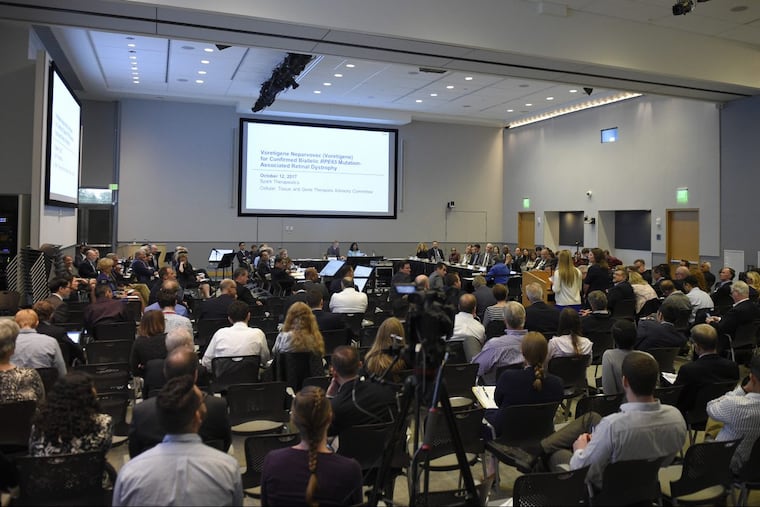FDA panel unanimously endorses Spark's gene therapy for rare blindness pioneered at CHOP
Gene therapy developed at Children's Hospital of Philadelphia gets a unanimous endorsement from FDA advisers to treat rare inherited blindness.

For Christian Guardino, 17, and an estimated 3,500 others born with a rare inherited genetic blindness, the first gene therapy that restores sight is both a life-changing breakthrough and a step closer to reality.
In a unanimous vote, a U.S. Food and Drug Administration committee recommended approval of Philadelphia drugmaker Spark Therapeutics' first-ever gene therapy for a genetic disease in the United States.
If the FDA accepts the recommendation, which is considered likely, the treatment developed by Spark and researchers at Children's Hospital of Philadelphia will usher in a new era in medicine — the first retinal gene therapy approval.
"My prediction is this work will ultimately transform the lives of individuals, perhaps millions, who are facing a life of blindness," Joan O'Brien, chair of the department of ophthalmology at the University of Pennsylvania and director of the Scheie Eye Institute, told the FDA panel. More than 260 genes are known to cause inherited retinal disease, and the first approval will propel further research into gene therapy treatments for other inherited retinal problems associated with other genes.
Among the ophthalmologists and retinal surgeons who attended the meeting in Silver Spring, Md., patients who received the gene therapy and urged approval told stories about how the treatment changed their lives.
Guardino told the panel that he lived in darkness the first 12 years of his life. It was difficult to relate socially to peers, and he could not see people's faces. After receiving the pioneering treatment in Philadelphia, the high school senior from Patchogue, N.Y., said that, almost overnight, he could see for the first time the moon, the stars, and a sunset.
"This gene therapy completely changed my life and gave me sight that I never had," said the teen, who fulfilled another dream in June when he earned a golden buzzer award that took him to the semifinals of NBC television's "America's Got Talent."
Caitlin Corey said that, as a blind person, she was unable to pursue her passion for math and science. In December 2013, days before her 21st birthday, she received the gene therapy and suddenly could see vibrant colors. "I was not living in a black-and-white world. I could go to a restaurant and see the plates."
Her father, Christopher Corey, told the panel that Caitlin was diagnosed at 9 months with the condition that at first resembles "night blindness," but progresses to almost total blindness. Until now, there has been no treatment. He said that not only was his daughter's sight "cured," but also her isolation, dependence, and unfulfilled potential.
A decision by the FDA, which usually follows its panel recommendations, is expected Jan. 12.
Spark's treatment, which injects a copy of a healthy gene directly into the eye's retina, was developed at CHOP based on decades of research spearheaded by Katherine A. High, Spark's cofounder and president.
"This is a big day. I've been working on this for a long time," High said after the vote. Work began in 2005 to initiate a clinical trial, and the first patient was enrolled and injected with the therapy on Oct. 11, 2007.
The panel experts did not question the sight-restoring potential of the treatment, but had questions about potential side effects, including macular thinning, ocular pressure, cataracts, retinal tears, and eye inflammation. Physicians who treated the patients said most side effects, termed "adverse events," occurred early and resolved over time.
Spark's treatment, to be known by the brand name Luxturna, does not give 100 percent vision. It is intended to be a onetime treatment. Analysts have speculated that Luxturna could bring in $100 million in 2018 and $650 million in 2022 in revenue. But the company has said no price has been set.
"Hopefully, if and when this gets approved, it will have a large impact on the patients and on the field in general," said Paul Yang, an eye specialist in genetics and ocular immunology at Casey Eye Institute at Oregon Health & Science University.
Spark's therapy is for Leber congenital amaurosis, a defect in a gene called RPE65. "It's a devastating disease in which patients become blind within the first year, if not the first 10 years, of life," Yang said. About 3,500 people in the United States and Europe live with the disease.
Ashley Carper told the panel that before the surgery her children, Cole and Caroline, who were 8 and 10 at the time, read from braille readers. Today their vision "is better than we could ever have imagined. We would enroll them in the trial again, no doubt whatsoever. It is our strong desire for other visually impaired individuals to have the same opportunities."
"I've heard so many stories like that," said University of Pennsylvania researcher Jean Bennett, part of the team that cloned the gene in a laboratory before the clinical trials. Bennett also assembled the prototype of an obstacle course to test vision and the ability of patients to navigate accurately and quickly in different levels of light after treatment. Her physician husband, Albert Maguire, performed many of the surgeries at Children's Hospital to deliver the gene therapy.
"The Carpers' mom told me that after the surgery, the kids came home and went to their rooms and said, 'Mom, when did you put these pictures on my wall? And the wallpaper is all changed.' "
"They hadn't seen it before," Bennett said. "This was the first time they'd seen it."